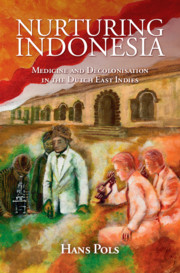Book contents
- Nurturing Indonesia
- Global Health Histories
- Maps
- Nurturing Indonesia
- Copyright page
- Dedication
- Contents
- Figures
- Acknowledgements
- Medical Institutions
- A Note on Spelling, Pronunciation, and Names
- Introduction: Colonial Dreams, National Awakenings, and Cosmopolitan Aspirations
- 1 Abdul Rivai: Medicine and the Enticement of Modernity
- 2 The Enchantment of Cosmopolitan Science: Student Life at the Dutch East Indies Medical Colleges
- 3 The Indies Youth Movements: Progress, Westernisation, and Cultural Pride
- 4 Professional Aspirations and Colonial Ambivalence: The Association of Indies Physicians
- 5 The Insults of Colonial Psychiatry and the Psychological Damage of Colonialism
- 6 The Great Depression: Rockefeller Initiatives and Medical Nationalism
- 7 Indonesian Physicians in the Greater East-Asia Co-Prosperity Sphere
- 8 Medical Heroism and the Indonesian Revolution
- 9 Medicine in Independent Indonesia: National Physicians and International Health
- Conclusion: The Rise and Decline of the National Physician
- Bibliography
- Index
3 - The Indies Youth Movements: Progress, Westernisation, and Cultural Pride
Published online by Cambridge University Press: 14 August 2018
- Nurturing Indonesia
- Global Health Histories
- Maps
- Nurturing Indonesia
- Copyright page
- Dedication
- Contents
- Figures
- Acknowledgements
- Medical Institutions
- A Note on Spelling, Pronunciation, and Names
- Introduction: Colonial Dreams, National Awakenings, and Cosmopolitan Aspirations
- 1 Abdul Rivai: Medicine and the Enticement of Modernity
- 2 The Enchantment of Cosmopolitan Science: Student Life at the Dutch East Indies Medical Colleges
- 3 The Indies Youth Movements: Progress, Westernisation, and Cultural Pride
- 4 Professional Aspirations and Colonial Ambivalence: The Association of Indies Physicians
- 5 The Insults of Colonial Psychiatry and the Psychological Damage of Colonialism
- 6 The Great Depression: Rockefeller Initiatives and Medical Nationalism
- 7 Indonesian Physicians in the Greater East-Asia Co-Prosperity Sphere
- 8 Medical Heroism and the Indonesian Revolution
- 9 Medicine in Independent Indonesia: National Physicians and International Health
- Conclusion: The Rise and Decline of the National Physician
- Bibliography
- Index
Summary
- Type
- Chapter
- Information
- Nurturing IndonesiaMedicine and Decolonisation in the Dutch East Indies, pp. 71 - 92Publisher: Cambridge University PressPrint publication year: 2018



